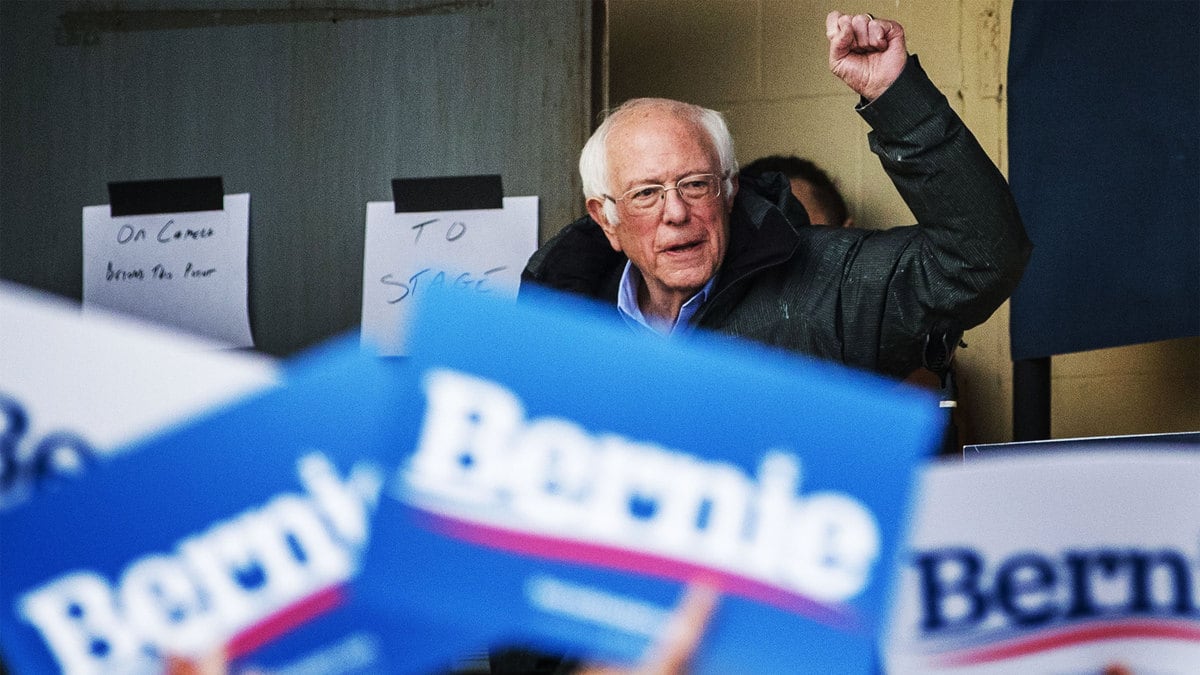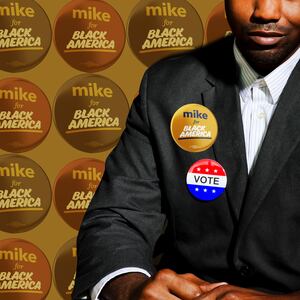New Hampshire is voting. I remember when this used to be an exciting day. Even if my candidate didn’t win, which he (they were all men) usually didn’t, I loved both the reliable rituals and the unexpected little accidents. If memory serves (the video doesn’t seem to be online), I recall Illinois Senator Paul Simon saying during his concession speech in 1988 that “our platform is strong”—right before the riser he was standing on collapsed.
Well, it’s not exciting now. It’s depressing. I’m depressed. Almost everybody I know, every Democrat anyway, is depressed. It’s a mess. Iowa was a shitshow and shouldn’t be first anyway. New Hampshire shouldn’t be second, it’s totally preposterous, yet the party lacks the stones to tell these self-important, second-tier states to go stuff it. The candidates don’t look like winners. The party looks like it might be headed toward a face-off between a billionaire and a man who wants to ban billionaires, neither of them really Democrats.
And Donald Trump is going to be re-elected.
I shouldn’t say “is going to be.” You never know. Lots will happen. But right now, that’s how I feel, and that’s how most people I know feel.
Bernie Sanders’ partisans don’t feel that way. He’s solidly ahead in a national poll for the first time, 25 percent to 17 for Joe Biden, and they’re excited. Good for them. I was pretty critical of Sanders in 2016. I’ve been less so this time around. I agree with most of his critique of where this country has gone wrong. I get why young voters are passionate about him. They’ve grown up in a country very different from the one I grew up in, one in which nothing countervails the power of the wealthy and the big corporations—no unions, no humility, no shared code of civic morality.
But man, he is a risky general election candidate. I know the theory of how he wins. I know that though turnout overall was way down in Iowa, youth turnout was up—a little higher, even, than in 2008. So that’s good. But if the rest of the people are staying home, that’s a big problem. Trump is going to generate massive turnout across all age groups (yes, there are young people for Trump, loads of them). Read this recent piece by Tom Edsall in The New York Times if you’re not depressed enough. It seems like there are certainly going to be a few million more Trump voters this time than last.
All this is to say nothing of Sanders’ past radicalism. You can say all you want that people don’t know or care about things he did or said 30 and 40 years ago. True—they don’t know or care now. But a couple billion dollars’ worth of attack ads later, they’ll know a lot of things they don’t know now, and I’d wager that a lot of them will care. Just remember this: At this point in 1988, there wasn’t a voter in America who knew the name Willie Horton. By that October, there wasn’t a voter who didn’t know his name.
Who or what is Sanders’ Willie Horton? We don’t know yet. But we can assume Republican oppo researchers know, and there’s probably not just one. And all that is to say nothing of his plans to more than double federal spending. I’m all for more federal spending. But even I blink at double. And anyway, I’m not a swing voter in a key state.
And yet, he’s going through this primary without facing serious challenges on all this. Here’s something else that soft Sanders enthusiasts should understand (the hard enthusiasts won’t hear any of these arguments): There are certain issues that won’t come to the fore in a Democratic primary because Democrats don’t care about them that much. For example, religious faith and patriotism aren’t Democratic litmus tests. But you’d better believe they’re Republican litmus tests. Also, Democrats won’t viciously red-bait Sanders. Well, Republicans will. Democratic voters need to think about these things.
But it’s not just Sanders. The whole field, while all of them seem like good, dedicated people, has disappointed. Elizabeth Warren is a great candidate in many ways. But why she came out for Medicare for All, I’ll never know. I and everyone I know with whom I discussed it at the time thought immediately, why is she doing this? This will surely come to grief, either in the primary or the general. Such an own goal. And indeed, her tergiversations on M4A are why she faded. She is a victim of sexism in many forms, overt and covert. No doubt about that. But if she’d staked out the most progressive health care position that was just short of M4A, she’d be leading right now, I have little doubt.
Joe Biden, what can you say? Here was the pitch he should have used from the start: I’m running for three reasons. One, I can win. Two, I will restore dignity to the Oval Office; America’s word will be trusted again. Three, I have a long agenda of things I want to do, from health care to climate change to blah blah blah. Point three was key. It would have preemptively answered the charge that he was just interested in “restoration.” I realize his problems lie elsewhere, but this kind of clear message would have made him much more formidable out of the chute.
Pete Buttigieg, I don’t hate him like all the cool kids seem to. He has a lot of talent. If he can beat Trump, fine by me. But then he unveils this deficit-reduction rhetoric yesterday. Who knows, maybe it will help him in today’s voting. But it’s not exactly inspiring. Amy Klobuchar has gotten better and better as the weeks have passed. Maybe she’ll bust out. But she doesn’t seem like she’s going to generate widespread excitement.
Then there’s Mike Bloomberg. Again, look, if he can win, fine. A new Quinnipiac poll has him just behind Biden nationally, and doing as well as any Democrat in a head-to-head contest with Trump. I’d be relieved and grateful to him for beating Trump, but at the same time, it would be pretty sad that it took a multi-billionaire who became a Republican when it suited him—and backed George W. Bush in 2004, and Scott Brown over Warren in 2012—buying his way into the White House.
As for the ones who dropped, they faced sometimes unfair obstacles, but they had limitations, too. I liked Kamala Harris. But she wasn’t as ready for this as I’d hoped—she made that great attack on Biden in the first debate, but then within a few days under questioning from reporters, she acknowledged that her busing position was about the same as his. She didn’t have a strong economic message. Cory Booker didn’t either.
Finally there’s the broader question of why there’s no obvious star in the Democratic Party. What’s happened? Where are the pols who can transcend these divisions and speak to everybody on the broad, wide left? Maybe the divisions have become too deep, and no one can do that. I don’t know. I just know it’s a pretty bad time to be divided.







